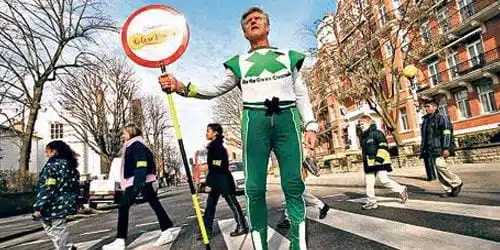
Grain silos are dangerous places. So are electricity sub-stations. And also playgrounds, railway tracks, any kind of junction if you are a cyclist, skateboarding without pads … the list goes on, it’s a world of terror and danger out there. All of this might seem obvious, but in the UK it took a small animated squirrel puppet to tell us a lot of this from the ’60s onwards. Tufty and his gang, including Willy Weasel and Policeman Badger were huge favourites with British audiences, as were the other Public Information Films, collected here in a sixth volume from the BFI.
Controversial subjects such as sexually transmitted diseases rub shoulders with anti-drink driving films; Tom Baker (arguably the greatest Dr.Who) voices a film about driving after dark, in his typical macabre fashion: Another World (1980). This has the look and feel of a documentary about ’70s serial killer the Yorkshire Ripper rather than a road safety film about the relative visibility of pedestrians and road markings. We are given a night stalker’s view of vulnerable women suddenly encountered on a darkened street. There are screeching tyres and screams.
Likewise, the carnage on the roads depicted as far back as the ’40s and ’50s in gems such as Mr Jones Takes The Air (1946) and Cyclists Turning Right fills one with relief that air bags and flashing indicators, high-visibility clothing and seatbelts were invented. Mr Jones thinks nothing of indulging in a lunchtime ‘nip’ in the pub and getting back behind the wheel.
Motorcycle Fashion Scene (1965) reminds one and all that it is better to be behind the times but alive, rather than fashion forward and dead. Don’t let going without a helmet thanks to your new up-do cost you your life. And, as for Tufty and the Gang? Well, The Furry Folk on Holiday (1967) witnesses the usual carelessness of one William Weasel. Who always manages, in a Kenny from South Park kind of way, to live to fight another day.
Yes, despite the hugely worthy and socially responsible messages here, many of these films are hilarious. The BFI certainly appreciates how people will respond to these – part nostalgia, part amusement. Dramatically and stylistically these are impressively made, but also offer a snap-shot of attitudes and social policy from previous decades without any hint of irony. They do invite mockery, but many retain a great deal of charm.
Dave Prowse, Darth Vader himself, appears in what was his regular line of work, the guise of The Green Cross Code man, ensuring that Blockhead Girl (1973) does not wind up under a bus. But what was it about his Bristol accent that directors could not tolerate? They dub him in this as well — not with James Earl Jones, mind you. Poor Dave, he had the look but not the voice.
Most memorable for me, however, is one of the shortest films, Hand (early ’70s). It has, from the memorably surreal title onwards, one of the creepiest and most chilling qualities of any three minutes of footage ever shot. Not that it would have occurred to me to do it in the first place, but it cemented in my mind that one must NEVER, NEVER return to pick up a spent firework.
The extras include the nostalgic ‘Furry Folk on Holiday’ (1967) with Tufty and the gang, and the ever-popular Bernard Cribbins (Dr Who) voicing ‘Play Safe’ (1978), the warning message about electricity sub-stations. To find some kind of purpose to this DVD compilation the BFI also provide their useful booklet of commentary and essays on the material.

